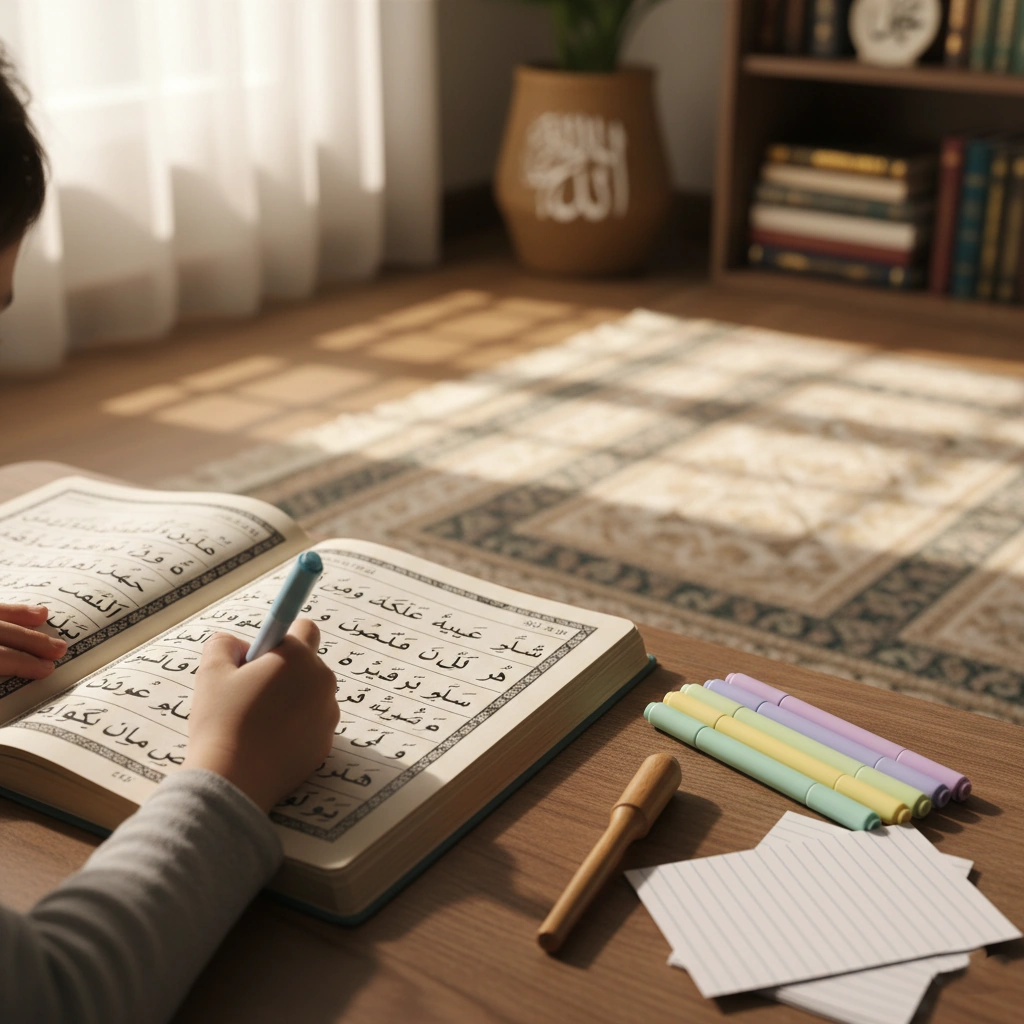The question of how parents can ensure their children become close to the Quran at early ages keeps on being raised by the parents. This does not involve any complex techniques and protracted lessons, it involves the creation of experiences within which Quran learning for kids becomes familiar, comfortable and relevant. When these early encounters are managed, the child automatically develops the life time relationship with the Book.
Why Early Exposure Matters
Sound and rhythm are understood by children even before being taught how to read. They start to see a pattern and a tone when they listen to surahs multiple times and even without even knowing it in a peaceful environment. It also makes them see themselves at an early age; the Quran turns out to be not something strange or frightening in their thought.
Parents often notice:
- A calmer attitude when listening to recitation.
- Gradual improvement in how children mimic Arabic sounds.
- More interest in learning when the Quran is part of daily routine.
These small signs are far more important than measuring how many surahs a child has memorized.
When Should Formal Learning Begin?
No standard age is present, however most children demonstrate ready-ness at age four to six. Some even listen earlier whilst others require time before they answer to established lessons.
A child may be ready if:
- They show curiosity when someone recites near them.
- They can focus long enough to repeat a few short words.
- They sit comfortably for a few minutes without stress.
If these signs are not present yet, continue gently exposing them to recitation and simple stories from the Quran. Patience maintains their interest.
Setting Up a Calm Learning Space

Children respond strongly to atmosphere. A comfortable place with few distractions can be a place that they identify with study and contemplation. This corner does not necessarily have to be extravagant – even a small mat, a child -friendly mushaf, and a small shelf are sufficient.
Useful ideas:
- Keep only a few items in the space. Simplicity encourages focus.
- Choose natural light or soft lamps to create a gentle mood.
- Play recitation softly before beginning a lesson to help the child settle.
When parents themselves recite regularly in that space, the child develops a quiet respect for the practice.
Your Influence as a Parent or Caregiver
Children learn most from what they see. If learning feels rushed or stressful, they reflect that mood. If it feels warm and consistent, they approach it with confidence.
A few principles make a noticeable difference:
- Encourage effort rather than perfection.
- Keep the experience short enough to end on a positive note.
- Talk to tutors or teachers so everyone follows the same approach.
- Remain adaptable. Some days will naturally go better than others.
Sensitivity matters. A calm guiding voice often teaches more effectively than any formal technique.
A Simple Approach for Early Learners
In the case of small children, a smooth progression makes them feel safe. The framework may be changed according to age and personality, though a loose outline could be as follows:
- A short opening – a dua or a minute of listening.
- Focused practice – letters, short words, or a small portion of a surah.
- A light activity – matching cards, tracing letters, or repeating lines with you.
- A gentle close – praise and a small reminder about the next session.
Progress usually begins with sound recognition, then letters, then short words and surahs, and eventually simple tajweed. Each step flows naturally when the child feels supported.
Keeping Learning Enjoyable
Children engage deeply when learning feels playful. A few creative elements can transform a short lesson into something memorable:
- Turn letter recognition into a small treasure hunt.
- Draw scenes from the meaning of short surahs together.
- Let the child “teach back” a line they learned as if they are the teacher.
- Walk around the room while reciting to keep their body involved.
This variation keeps their attention fresh, especially at younger ages.
Introducing Tajweed and Memorization
Tajweed need not be overwhelming. Start with clarity of letters, then gradually introduce simple ideas like elongation. Demonstrate naturally, and let the child imitate you without pressure.

For memorization:
- Choose short, meaningful surahs.
- Practice in small segments, repeated throughout the week.
- Link meaning to everyday experiences so the verses feel relevant.
Understanding gives children a sense of purpose behind the recitation.
When and How to Use Digital Tools
However, technology may be used to facilitate learning with a balanced combination of human instructions. It is helpful when adults sit next to young children during the initial online sessions or with using an application the first time.
Choose tools that:
- Offer slow, clear pronunciation.
- Keep lessons short and interactive.
- Suit the child’s age and attention span.
Screen time should stay limited, but well-chosen digital resources can reinforce what the child learns with you.
A Gradual Eight-Week Starting Plan
Here is a flexible outline many families use:
- Weeks 1–2: Introduce a set of letters and play short surahs daily.
- Weeks 3–4: Begin forming simple words and review letters often.
- Week 5: Start one short surah with line-by-line repetition.
- Week 6: Add one easy tajweed concept.
- Week 7: Review everything through games, listening, and simple reading.
- Week 8: Let the child recite to a family member to build confidence.
This plan can be slowed down or sped up depending on your child.
Handling Challenges With Care
Every child experiences moments of resistance, hesitation, or distraction. These moments are normal.
Common solutions:
- If attention fades, divide the session into two mini-lessons.
- When the child resists, offer limited choices: which surah to listen to, or which activity to do.
- If they forget something learned earlier, return to short, easy steps for a few days.
Gentle adjustments maintain long-term motivation.
Knowing When to Start Formal Classes
A classroom or a tutor can assist the child further when he or she demonstrates the reasonable focus, constant interest, and willingness to learn, when the other person is not his or her parent. Professional training enhances pronunciation and gives a systematic course of action.
Recommended Resources
Helpful items include:
- A mushaf designed for young readers.
- Clear, slow-paced audio recitation.
- Letter cards and simple charts.
- Apps created specifically for early learners.
- Teachers experienced with children.
Use whatever tools fit your home and the child’s learning style.
Frequently Asked Questions by Parents
Majority of parents think that they are not interested, however, most often the child is overwhelmed or intimidated in case of making mistakes. The shorter the lesson time, the lower the volume, and the time of sitting with them during the first few minutes, usually corrects more than the most rigid routine.
Attempt to relate the verses with their world. Even a piece of real life example or just chatting about a verse when walking along helps. Children do not want anything that is put into their minds.
When your child falls quiet, is tense or evades lesson time, that is most likely the initial clue. In a week the same child usually gets more confident when you slow down and allow the child to learn in their own pace.
Basics can be taught by parents, however, tutors introduce structure and patience which can be difficult to sustain everyday, especially when it comes to tajwid. The majority of parents are only kept at a distance, by reading the lesson later or reciting it aloud.
Keep goals small. Celebrate tiny wins. Even allowing the child to decide on which reciter to use or a pretty notebook to use lessons will do. Children are also encouraged when the process of learning is light and regular.
Closing Reflection
Until the presentation of the Quran to a small child, it is not about memorizing the contents within a short time, or achieving milestones before others. It is the creation of a relationship that is recomforting and natural. When teachings are short, frequent and friendly, the Quran will serve the child as he/she grows. Whenever minor routines are performed, it eventually becomes a permanent connection with the Book.
If you want your child to grow with a calm, steady, and heartfelt connection to the Quran, begin now. Explore our guided online classes, simple learning tools, and supportive teaching approach designed for young learners on Alhamd Islamic Center. A few minutes each day can shape a lifelong bond with the Book of Allah.



